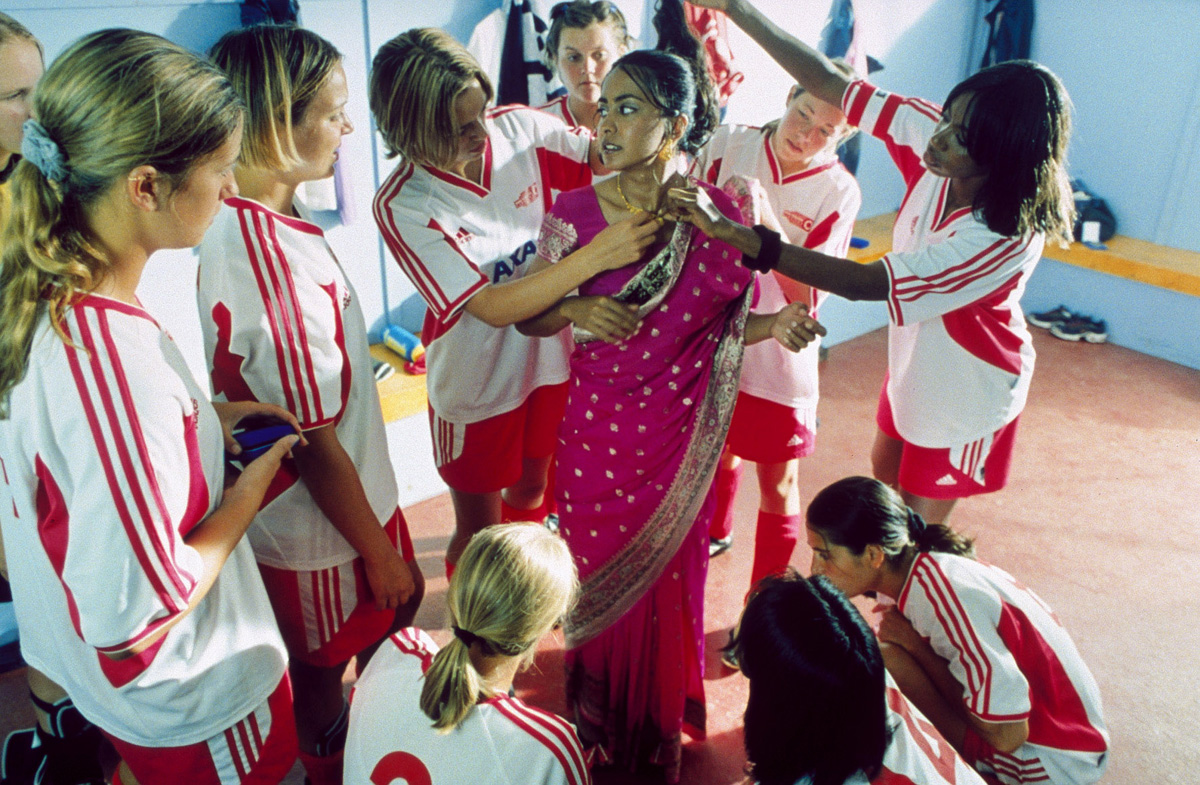
This guest post by Allie Gemmill appears as part of our theme week on Interracial Relationships.
Through Western lenses, Indian women are often framed as an exotic and forbidden ideal. Depicted as embodying a degree of Eastern mysticism, rooted in a culture of patriarchal duty, the Indian woman as love interest or girlfriend is often paired with a white man who views her with a sense of “otherness.” It then falls to the Indian woman to negotiate a specific kind of Eastern-Western iconoclasm — a clash steeped in racial and cultural sentiments — in order to let her romance with a white man flourish. The white male-Indian female dynamic is also often portrayed as a threat to traditional Indian expectations of a woman marrying within her racial group and the emphasized gender roles she has been raised to conform to are challenged.
Both Bend It Like Beckham and The Darjeeling Limited examine Indian women and their romances with white men. Within the interracial relationships explored in these respective films, both Jess (Parminder Nagra) and Rita (Amara Karan) serve as love interests but not long-term romantic partners for their white male counterparts. They are burdened with navigating deeply impressed racial boundaries as they move through a modern society. Meanwhile, their white male love interests are allowed to indulge their romantic curiosities with relative ease. This is crucial to note because these white men are rarely challenged to share the burden of interracial courtship, free from the onus of cultural or racial expectations. For Indian women, as experienced here, it is difficult to separate race from amorous pursuit; race serves as a definitive and non-negotiable aspect of the relationships between the Indian women and white men.
BEND IT LIKE BECKHAM
In Bend It Like Beckham, protagonist Jess is torn between honoring her Punjabi Sikh Indian roots (as embodied in her strict parents and sister, who is marrying according to racial and cultural codes) and the English culture which she has embraced and surrounds herself with (as embodied in her love of soccer and her budding romance with her white coach, Joe). Although she bears the burden of fetishization from her English peers in conjunction with her pursuit of a soccer career and gendered/racial expectations from her family, Jess for the most part negotiates a coalition between the two insofar as she is able to pursue her personal ambitions. Jess is forced to reckon with a strict code of honor and respect for her family throughout the film, as outlined by her Indian culture, which the film positions as a threat to not only Jess’s happiness in soccer but also in her budding romance with Joe (Jonathan Rhys-Meyers).
Gender is constantly conflated with racially-based codes of conduct: Jess is repeatedly questioned by her mother and sister about why she would not eagerly desire to marry young and marry an Indian man. Her mother is quick to bawl her out for participating in soccer, here read as masculine and therefore thoroughly out of line with how Indian women should act in public. Jess is considered a reflection of her family’s morals at all times when she is in public and any time she acts according to her own desires, she risks shaming her family and threatening her sister’s impending nuptials. In this world, Jess bears the brunt of delicately mollifying her family while speaking for her “white/masculine” athletic ambitions.

Add to this a budding romance with Joe, a white Irishman, and Jess’s own racial and gender predicaments double. Through Joe’s eyes, Jess is positioned as an exotic “other,” a young Indian girl seemingly sheltered from the pleasures of contemporary British culture. During Jess’s “transformation” moment — when her friends lender her more revealing and sexy garb to wear out to a club in Berlin — the camera lingers on her body before cutting to Joe’s furtively intrigued looks. Despite there being other women of color in her soccer team, Jess is the only one treated as different from the rest, with other scenes depicting the bemusement her teammates have over her Indian culture. This moment seals the forbidden love that Jess and Joe will cultivate for the latter half of the film. As they find themselves drawn to each other, Joe is narratively allowed the ease to step in when necessary to speak on behalf Jess. Twice he makes speeches to her father about how deeply he cares for her and believes in her abilities as a soccer player. Both times Jess does not get the chance to contribute to the conversation between the men although her agreement is implied. Joe risks little in taking a romantic shine to Jess whereas Jess appears to risk everything. Furthermore, he is allowed to pursue her, however discreetly, without threat of losing his job or credibility.
As gender and race are tightly bound up together in Bend It Like Beckham, director Gurinder Chadha makes it clear that an interracial relationship of this specific dynamic (white man-Indian woman) is a sincere threat to a young Indian woman. Even when transplanted to the London suburbs, Jess and her family seem to live in a tight-knit Indian community seemingly bent on being hermetically sealed from white English life. This clash of racial and social ideologies make for the biggest villains to Jess’s own chance at happiness.
THE DARJEELING LIMITED
In The Darjeeling Limited, Rita is reduced to an object that Jack (Jason Schwartzman) is infatuated with while on vacation with his older brothers. Jack’s storyline is centered around a recent and gruesome breakup, leaving him vulnerable. Upon seeing Rita for the first time, while she makes the brothers comfortable, Jack firmly sets his sights on her. While Rita is a minor character in the adventures of the Whitman brothers, she can be read as a boldly fetishized representation of Indian women. In doing this, we place further burden on how Indian women are characterized onscreen.
Rita is presented as a modern and beautiful woman, but ultimately repressed, ostensibly by the Indian culture in which she was raised. She is seemingly trapped aboard the train, The Darjeeling Limited, with her boyfriend, an intense young Sikh man who runs the train with an iron fist. She is willing to bend the moral code by sneaking away with Jack to have sex (which she enjoys in the moment) but rebuffs him when he continues to make advances. She sneaks cigarettes in between service snacks and pouring tea. Albeit committed to her duties, she does them as if half-zombified, stating at one point that she has “got to get off this train.” She is deadened in a stylish way as only Wes Anderson creates his characters. In all of these little actions, Rita becomes Jack’s forbidden interracial-love-interest-cum-souvenir.
In addition to having little screen time, the script seems further set on reducing Rita to being a faceless trope when Jack returns to the trio’s train carriage, attempting to appear nonchalant after having sex with Rita mere moments after meeting her. Jack’s brother Francis (Owen Wilson) incredulously asks, “Did you just fuck that Indian girl?” It’s a small moment but effective in immediately redacting any shred of agency Rita may own. A white man simply lumping Rita into the throngs of Indian women that surround him betrays an intact colonial hierarchy as modern microagression. Jack does nothing to protest this categorization of his potential love interest and instead continues to pursue her, believing she may somehow heal him or make him feel better about himself for a time. Rita’s treatment as a cure-all to white male pain feels oddly preposterous, especially considering the film is set in a modern era. What right does Jack have to take so quickly to Rita in both a romantic or needy aspect? What entitles him? While Rita gives Jack a reason to believe there may be the stirrings of a romance, their love seems doomed not only because of his neediness and apathy to fully commit, but also because she seems wholly restricted by her relationship to a traditionally Indian man as well as her innate sense of duty to her work.
Amidst the flurry of lust flung upon her by Jack, Rita appears to be inured to this kind of attention. While she navigates her life in a position of literal service and subservience to the passengers of the train, she holds that place metaphorically as an Indian woman. In vocalizing her desire to escape the confines of the train, she negates a racially-inbred sense of second-class status as an Indian woman. While she is wholly defined by her race and gender in Darjeeling, she is imbued with a defiance as only modern women seem to possess. Jack is allowed to ply her with sex and cigarettes because he can temporarily indulge in the local fare; Rita, however, is living in a very real and very traditional Indian society, unable to escape or completely negotiate her duty with her desire.
It is perplexing to see that both films seem set on giving the impression that Indian society is ultimately restrictive and patriarchal to women. In reading these films (one made by an Indian woman born in Nairobi and raised in England, the other made by a white man from Texas), both exude the confinement of Indian women and their struggle to navigate a modern (read: white, Eurocentric) world amidst such strong ties to their racial background. It would be the hope that when Chadha placed Jess in the white world of suburban London and Anderson wrote Rita into her native India, we would see some characters reflective of these different but ultimately Western perspectives. Instead, both directors have unwittingly constructed their Indian women to abide by an implied universal gendered and racial code. As such, these cinematic Indian women are painted into a corner in juggling their race with their ambition and most importantly, their romantic desires.
Allie Gemmill is a film journalist based in Tampa, FL. She is the founder and creative director of The Filmme Guild, a feminist film salon dedicated to examining the intersections of women and film. Follow her on Twitter and Medium.
